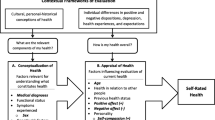Abstract
Dispositional self-compassion has been linked to better mood and better health behaviors in numerous studies, albeit in cross-sectional designs employing self-report measurement. This study (n = 42) experimentally evaluated how a self-compassion (versus self-criticism) manipulation impacted patterns of positive and negative emotion, tested whether it increased health behavior (flossing) and motivation to floss following negative feedback, and assessed whether changes in emotion predicted changes in behavior. As expected, there was greater positive and less negative mood following the self-compassion induction, but only temporarily; there were no buffering effects of the self-compassion intervention on mood after critical external feedback. In contrast to expectation, self-compassion predicted lower floss time and did not impact motivation to floss in future. These findings suggest that while being kind to oneself instead of self-critical may promote better mood, it may be less effective in motivating certain health behaviors like teeth flossing, at least in an experimental setting.



Similar content being viewed by others
References
Adams, C., & Leary, M. (2007). Promoting self-compassionate attitudes toward eating among restrictive and guilty eaters. Journal of Social and Clinical Psychology, 26(10), 1120–1144.
Breines, J., & Chen, S. (2012). Self-compassion increases self-improvement motivation. Personality and Social Psychology Bulletin, 38(9), 1133–1143.
Brion, J., Leary, M., & Drabkin, A. (2014). Self-compassion and reactions to serious illness: the case of HIV. Journal of Health Psychology, 19(2), 218–229.
Brown-Johnson, C., & Popova, L. (2016). Exploring smoking stigma, alternative tobacco product use, and quit attempts. Health Behavior and Policy Review, 3(1), 13–20.
Consedine, N., & Moskowitz, J. (2007). The role of discrete emotions in health outcomes: a critical review. Applied and Preventive Psychology, 12(2), 59–75.
Consedine, N., Morgenstern, A., Kudadjie-Gyamfi, E., et al. (2006). Prostate cancer screening behavior in men from seven ethnic groups: the fear factor. Cancer Epidemiology, Biomarkers & Prevention: A Publication of the American Association for Cancer Research, Cosponsored by the American Society of Preventive Oncology, 15(2), 228–237.
Ferreia, C., Trindade, I., & Ornelas, L. (2015). Exploring drive for thinness as a perfectionistic strategy to escape from shame experiences. Spanish Journal of Psychology, 20, 18–E29.
Friis, A., Johnson, M., Cutfield, R., & Consedine, N. (2015). Does kindness matter? Self‐compassion buffers the negative impact of diabetes‐distress on HbA1c. Diabetic Medicine, 32(12), 1634–1640.
Friis, A., Johnson, M., Cutfield, R., & Consedine, N. (2016). Kindness matters: a randomized controlled trial of a mindful self-compassion intervention improves depression, distress, and HbA1c among patients with diabetes. Diabetes Care, doi: 10.2337/dc16-0416.
Hall, P., & Fong, G. (2007). Temporal self-regulation theory: a model for individual health behavior. Health Psychology Review, 1(1), 6–52.
Herman, C., & Mack, D. (1975). Restrained and unrestrained eating. Journal of Personality, 43(4), 647–660. doi:10.1111/j.1467-6494.1975.tb00727.x.
Kelly, A., Zuroff, D., Foa, C., & Gilbert, P. (2010). Who benefits from training in self compassionate self-regulation? A study of smoking reduction. Journal of Social and Clinical Psychology, 29(7), 727–755.
Leary, M., Tate, E., Adams, C., et al. (2007). Self-compassion and reactions to unpleasant self-relevant events: the implications of treating oneself kindly. Journal of Personality and Social Psychology, 92(5), 887–904.
Macbeth, A., & Gumley, A. (2013). Exploring compassion: a meta analysis of the association between compassion and psychopathology. Clinical Psychology Review, 32(6), 545–552.
Magnus, C., Kowalski, K., & McHugh, T. (2010). The role of self-compassion in women’s self-determined motives to exercise and exercise-related outcomes. Self and Identity, 9(4), 363–382.
Neff, K. (2003a). The development and validation of a scale to measure self-compassion. Self and Identity, 2, 223–250.
Neff, K., & Dahm, K. (2015). Self-compassion: what it is, what it does, and how it relates to mindfulness. In B. D. Ostafin, M. D. Robinson, and B. P. Meier (Eds.), Handbook of Mindfulness and Self-Regulation (pp. 121–140). New York: Springer.
Neff, K., Kirkpatrick, K., & Rude, S. (2007). Self-compassion and adaptive psychological functioning. Journal of Research in Personality, 41, 139–15.
Neff, K. (2015). The self-compassion scale is a valid and theoretically coherent measure of self-compassion. Mindfulness. Advance online publication, doi:10.1007/s12671-015-0479-3
Raes, F., Pommier, E., Neff, K., et al. (2011). Construction and validation of a short form of the self-compassion scale. Clinical Psychology and Psychotherapy, 18, 250–255.
Schwarzer, R. (2008). Modeling health behavior change: how to predict and modify the adoption and maintenance of health behaviors. Applied Psychology, 57(1), 1–29.
Shapiro, S., Brown, K., Thoresen, C., & Plante, T. (2011). The moderation of mindfulness‐based stress reduction effects by trait mindfulness: results from a randomized controlled trial. Journal of Clinical Psychology, 67(3), 267–277.
Shepherd, D., & Cardon, M. (2009). Negative emotional reactions to project failure and the self‐compassion to learn from the experience. Journal of Management Studies, 46(6), 923–949.
Sirois, F., Kitner, R., & Hirsch, J. (2015). Self-compassion, affect, and health-promoting behaviors. Health Psychology, 34(6), 661–669.
Smeets, E., Neff, K., Alberts, H., et al. (2014). Meeting suffering with kindness: effects of a brief self‐compassion intervention for female college students. Journal of Clinical Psychology, 70(9), 794–807.
Terry, M., Leary, M., & Mehta, S. (2013). Self-compassionate reactions to health threats. Personality and Social Psychology Bulletin, 39(7), 911–926.
Thompson, B., & Waltz, J. (2008). Self‐compassion and PTSD symptom severity. Journal of Traumatic Stress, 21(6), 556–558.
Wang, P., Beck, A., Berglund, P., McKenas, D., Pronk, N., Simon, G., et al. (2014). Effects of major depression on moment-in-time work performance. American Journal of Psychiatry, 161, 1885–1891.
Author information
Authors and Affiliations
Corresponding author
Ethics declarations
The study was funded by the University of Auckland as part of the doctoral studies of first author AF. The study received approval from the University of Auckland Human Ethics Committee, and complies with ethical standards.
Conflict of Interests
The authors declare that they have no competing interests.
Rights and permissions
About this article
Cite this article
Friis, A.M., Johnson, M.H. & Consedine, N.S. Paradoxical Effects of Self-Compassion on Mood and Teeth Flossing Behavior in an Experimental Setting. Mindfulness 8, 150–158 (2017). https://doi.org/10.1007/s12671-016-0585-x
Published:
Issue Date:
DOI: https://doi.org/10.1007/s12671-016-0585-x




